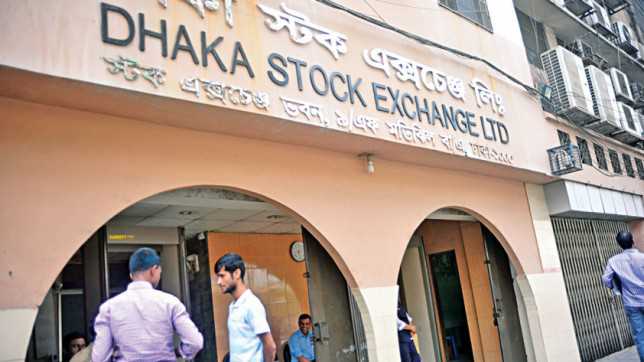Propping up Stock Market: Govt measures falling flat

Image collected
The government’s recent measures to prop up the stock market appear to have failed as the unusual fall of share prices continues to rattle investors.
Yesterday, the DSEX, the benchmark index of Dhaka Stock Exchange, slumped to a 33-month low to 4,888 points, losing 533.61 points or 9.84 percent since July 2. The investors have already lost Tk 31,349 crore in share value.
Earlier in May, Bangladesh Bank widened the banks’ scope for investing in the stock market as part of efforts to revitalise it.
In a circular, the BB said the banks’ investment in non-listed securities -- such as equity, non-convertible cumulative preference share, non-convertible bond, debenture and open-ended mutual funds -- would not be counted as capital market exposure.
In the budget for fiscal 2019-20, the government also doubled tax-free dividend income to Tk 50,000 to encourage individuals to invest more in the stock market.
In July, Bangladesh Securities and Exchange Commission, the regulator of the stock market, held a meeting with stakeholders and took 22 initiatives to win back the confidence of investors.
The measures include raising quota for general investors in case of initial public offering (IPO) to 50 percent from 30 percent, increasing lock-in period for sponsors’ shares to three years and a ban on giving bonus shares by mutual funds.
But these steps failed to yield any results.
On Monday, Finance Minister AHM Mustafa Kamal held a five-hour meeting with stakeholders and independent analysts to find out ways to stabilise the stock market.
Emerging from the meeting, he gave assurance that good governance would be ensured in the stock market and state-run companies would be listed with it.
Yet, the DSEX dropped 30 points the following day and 41 points yesterday.
Talking to The Daily Star, a number of stakeholders and experts blamed liquidity crisis, deteriorating health of banks, lack of quality stocks and share manipulation for the slump in the stock market.
Mizanur Rahman, professor of accounting and information systems at Dhaka University, said, “Share prices have been going down due to the ongoing liquidity crisis of financial institutions.”
These institutions don’t want to invest in the market now as they fear further “pressure” in the coming days, he said.
The asset quality of banks is questionable, and their operating cash flow is also very low, which will ultimately put more pressure on liquidity, mentioned Mizanur.
He recommends solving the liquidity crisis by ensuring good governance.
The financial sector, especially banks and non-bank financial institutions (NBFIs) has been facing severe liquidity crunch since February 2018.
Seeking anonymity, a senior bank official said the banks and the NBFIs are the drivers of the stock market but they have been plagued by rising nonperforming loans (NPLs), scams and lack of governance.
NPLs stood at Tk 112,000 crore or 11.50 percent of the total outstanding loans. If rescheduled and written-off amounts are included, the stressed assets of banks would be around 20 percent of the total loans.
Though the BB has widened the banks’ scope for investing more in the stock market, they have hardly any money for that, added the bank official.
Another banker said, “The regulator’s decision to extend the tenure of the closed-end mutual funds from 10 years to 20 years has dampened the investors’ confidence.”
Many invested in the mutual funds to gain profits within a certain period, but now they will have to wait for another 10 years to get the benefits, added the banker.
Talking to this correspondent, a stock broker said a lack of quality stocks is a key reason behind poor participation of investors in the stock market.
If the government fails to bring reputed local and multinational companies to the market, it will be difficult to restore the investors’ confidence, the broker pointed out.
Foreign investors are also selling off shares over the last few months due to confidence crisis and the tussle between the telecom regulator and Grameenphone over audit claims, added the broker.
Bangladesh Telecommunication Regulatory Commission (BTRC) made an audit claim of over Tk 12,500 crore from GP. The BTRC also sent a show-cause notice to GP, asking it to explain why its licence would not be cancelled for not paying dues.
The price of each GP share, the largest listed company, dropped to Tk 308 yesterday from Tk 504 on February 18. If the price of a GP share goes down by Tk 1 only, the DSEX drops 3 points.
Requesting anonymity, a stock broker said the stock market depends heavily on the financial institutions. When they reduce investment, the market goes down.
“We need to come out of such a situation by building up a strong investor base. To do so, stocks of well-performing firms need to be brought to the market and the stock market regulator will have to curb share manipulation.”
The DSE data shows the share prices of 10 poorly-performing companies soared surprisingly by 9 to 37 percent when the overall market fell 4.26 percent in the last three weeks.
Such share manipulation affects the investors’ confidence, the broker added.
Source: https://www.thedailystar.net
Tags :
Previous Story
- 4 major reasons acting behind liquidity crisis in...
- Deactivation of around 21 Million Sims by this...
- Grameenphone’s Call Rate is expected to have an...
- Bangladesh's big draws for business
- Dhaka stocks dip for 3rd week as banks,...
- Grameenphone named significant market power
- A Week Of Deep Diving Into Mobile, Internet...
- Bangladesh is on track to embrace new technologies